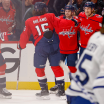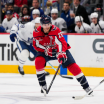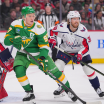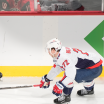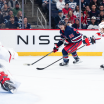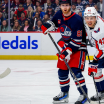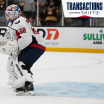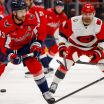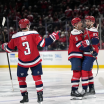A day after the team lost its final game of the 2022-23 regular season to New Jersey at Capital One Arena, the Capitals announced that the team and head coach Peter Laviolette have mutually parted ways. Laviolette just concluded his third season behind the Washington bench, a period that was - until the second half of this season - marked with regular season success despite an unrelenting set of adverse circumstances from the time he accepted the position in September of 2020.
Caps and Laviolette Part Ways
A day after '22-23 season concludes, Caps and Laviolette go separate ways after three seasons
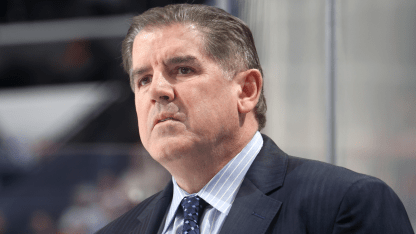
By
Mike Vogel
WashingtonCaps.com
Friday afternoon's announcement came hours after a morning meeting between the coach and Caps' senior vice president and general manager Brian MacLellan.
As the 19th head coach in the franchise's nearly half century history, Laviolette finished with a 115-78-27 record (.584), ranking fourth amongst those 19 previous bench bosses in points percentage. Nearly a third of Laviolette's total of regulation losses were amassed in his last half season on the job.
Washington made the playoffs in each of Laviolette's first two seasons in Washington, but it was unable to get past the first round in either postseason. This season, the Caps missed the Stanley Cup playoffs for the first time since 2014, ending the second-longest active playoff streak (eight seasons) in the League.
At the exact midpoint of the just-completed '22-23 campaign, the Caps were 22-13-6 and on pace for exactly 100 points, a mark they've hit - or, in the case of the pandemic-abbreviated seasons, have been on pace to hit - in each of the previous eight seasons, and a figure that would have had the team comfortably in the playoffs for a ninth straight season if they had been able to maintain it.
But Washington's second half went off the rails. The team was only able to win consecutive games twice, and it was never able to win as many as three straight games at any point after the turn of the calendar. A six-game losing streak in mid-February led to a quartet of trades ahead of the March 3 trade deadline, taking five regular players out of an already injury-riddled lineup.
When defenseman John Carlson returned on March 23 from a three-month absence from the lineup because of a fractured skull and severed temporal artery, it marked the first time all season the Caps had their remaining core of players from the 2017-18 Stanley Cup championship team on the ice at the same time. But it was way too late; the Caps' chances of reaching the postseason were infinitesimal by then. Another six-game winless slide (0-5-1) followed, and the Caps concluded '22-23 with a 5-4 overtime loss to New Jersey on Thursday night, a game in which they weren't able to maintain a pair of three-goal leads.
After playing at a .610 points percentage - 12th in the League and 7th in the Eastern Conference - through the first half of the season, the Caps plummeted to a 13-24-4 mark (.366), the second-worst record in the NHL in the second half.
Midway through the season, the Capitals were 10th in the League with an average of 3.34 goals per game, and they were ninth in goals against at 2.76. Over the season's final 41 games however, the Caps' offensive output dipped to 2.83 goals per game (22nd in the NHL) and its goals against average bloated to 3.61 per game (26th), though the latter figure was inflated somewhat by yielding a dozen empty-net goals against, the second highest total in the League during the second half.
The high total of empty-net goals allowed illuminates another problem; the Capitals rarely played with a lead in the second half of the season. Through the season's first 41 games, Washington led for 923:24 of the 2483:59 of hockey in played (37.17%), the seventh highest total in the NHL to that point. In the second half, the Caps led for only 616:59 of a total of 2493:18 (24.75%), ranking 28th in lead time.
Although the Caps were also beset by injuries throughout Laviolette's time in Washington - he never had a full lineup with every player available to him at any point in his 220 games here - the constant absences were mitigated by strong performances from the team's star players in the previous two seasons, and by reasonably good health on the back end.
In 2021-22, the trio of Alex Ovechkin, Tom Wilson and Evgeny Kuznetsov put together a stellar first half to help keep the Caps aloft in the standings while Nicklas Backstrom worked his way back into the lineup after missing the first third of the season, and while T.J. Oshie was in and out of the lineup with injuries on multiple occasions. All six of Washington's top six blueliners played between 72 and 79 games in '21-22, leading to a sense of continuity and familiarity in pairings. The Caps allowed 2.95 goals per game that season, finishing 13th in the NHL.
This season, injuries never let up, and the man-games lost increased from 288 to 441. It wasn't just the quantity of the man-games either; it was also the quality of the players missing from the lineup.
From 2010-11 through 2019-20, the Caps' core trio of Ovechkin, Backstrom and Carlson was a durable bunch. In that full decade's worth of seasons, only twice did the Caps have less than 95.7% of attendance from those three players combined. When Backstrom missed half the season with a concussion in 2011-12, the trio's attendance was at 82.1 pct. of all available man-games. Carlson played every game and Ovechkin missed only four games. The other instance was 2015-16 when attendance was at 85.4% because of Carlson missing 26 games with a couple of different ailments. When the Caps won the Stanley Cup in 2017-18, attendance was at 99.6%, matching that of 2014-15 and coming in just under the 100% in the lockout-abbreviated 2012-13 season.
Laviolette didn't have that luxury. The three stars' attendance rate was 90.5% in Laviolette's first season of '20-21, it dipped to 82.1% in 2021-22 and plummeted to 59.6% this season. Washington also didn't have Wilson for half of this season, either. And while they had all six of their top six blueliners play at least 72 games last season, only two (Nick Jensen, 76 and Trevor van Riemsdyk, 75) did so this season.
The lineup was a revolving door throughout 2022-23. The longest stretch in which Washington was able to dress the same 20 players was a paltry four games, from Nov. 25-Dec. 1. And even some of the players who remained relatively healthy throughout the season fell dramatically in the second half.
Center Evgeny Kuznetsov put up nearly a point per game in the first half, posting six goals and 36 points in 40 games, along with a plus-2. In the second half, Kuznetsov's production plummeted to six goals and 19 points, along with a team worst minus-28.
In his last 20 games of the season, Kuznetsov contributed one goal and six points to the Caps' cause, and he was minus-14.
Winger Anthony Mantha played all 41 games in the first half, averaging 14:24 per night in ice time and totaling nine goals and 23 points. In the second half, Mantha was scratched frequently; he played in only 26 games. While his ice time remained similar at 13:56 per night, Mantha managed just two goals and four points in the second half of the season.
Kuznetsov ($7.8 million) and Mantha ($5.7 million) combined to account for more than 16 percent of the $82.5 million upper limit on the NHL's salary cap this season. When two players of that stature are that unproductive for that long - especially in light of all the other ongoing injuries and with five regular players being traded away during the same span - any coach and any team will be hard-pressed to have success.
An unrelenting spate of injuries was at the root of Washington's problems, but Laviolette was never one to even hint at using that as an excuse. Washington ended up with a total of 441 man-games lost to injury, its highest total since it racked up 511 man-games lost in a 68-point season back in 1998-99. Ron Wilson was the Caps' coach in those days, and before the start of the 1999-00 season, he had this to say about the injury-plagued '98-99 season: "If we were healthy last year, things would have been different. We lost 515 [sic] man-games. That's twice as many as anybody else. Sportswriters don't like to hear that excuse, but that's six regulars a game."
Like many of his players, Laviolette was in unfamiliar territory as the second half spiraled out of control, leaving the Caps outside the playoff picture for the first time in nine years. Laviolette has coached in the NHL in every season since 2001-02, and this season marked the first time since the lockout-shortened season of 2012-13 that he was coaching a team at season's end that did not make the playoffs.
Washington's brass has not been shy about its intentions for the team over the next three seasons, the final three seasons on Ovechkin's contract. The Caps' captain finished the season with 822 career goals, and he needs 73 goals over those three seasons in order to surpass Wayne Gretzky (894) and conclude his career as the NHL's all-time leading goal scorer. Ovechkin has expressed his intention to compete for the playoffs and to win another Stanley Cup during that span, and the Caps have agreed to pursue that path.
In a coaching career than spans 21 seasons in the NHL, Laviolette has been behind the bench for 1,430 regular season games, 11th most in League history. His total of 752 wins is tops among all American-born coaches and ranks eighth all time. He has coached five different NHL franchises, and has taken three of them to the Stanley Cup final, winning the Cup with Carolina in 2006.
On paper, Laviolette appeared to be the right coach to achieve Washington's goals of getting back to the playoffs and being a Cup contender for the next three seasons, and the Caps were certainly pleased with his work here through his first two and a half seasons. A contract extension certainly seemed possible - if not probable - at the midpoint of the season, but with Laviolette exiting the scene today, the Caps are once again set to begin another coaching search.

